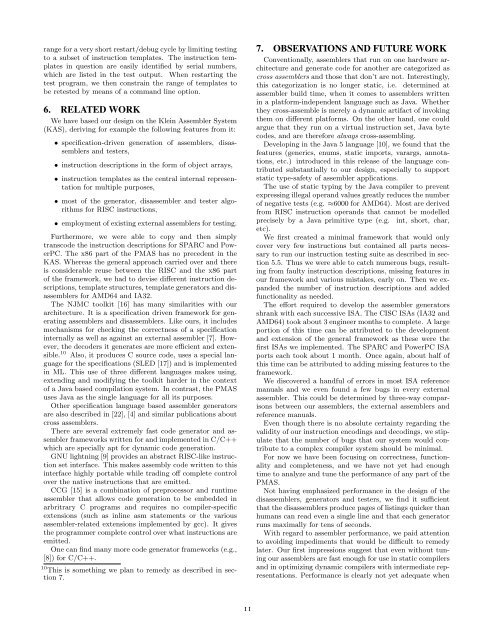4th International Conference on Principles and Practices ... - MADOC
4th International Conference on Principles and Practices ... - MADOC
4th International Conference on Principles and Practices ... - MADOC
Create successful ePaper yourself
Turn your PDF publications into a flip-book with our unique Google optimized e-Paper software.
ange for a very short restart/debug cycle by limiting testing<br />
to a subset of instructi<strong>on</strong> templates. The instructi<strong>on</strong> templates<br />
in questi<strong>on</strong> are easily identified by serial numbers,<br />
which are listed in the test output. When restarting the<br />
test program, we then c<strong>on</strong>strain the range of templates to<br />
be retested by means of a comm<strong>and</strong> line opti<strong>on</strong>.<br />
6. RELATED WORK<br />
We have based our design <strong>on</strong> the Klein Assembler System<br />
(KAS), deriving for example the following features from it:<br />
• specificati<strong>on</strong>-driven generati<strong>on</strong> of assemblers, disassemblers<br />
<strong>and</strong> testers,<br />
• instructi<strong>on</strong> descripti<strong>on</strong>s in the form of object arrays,<br />
• instructi<strong>on</strong> templates as the central internal representati<strong>on</strong><br />
for multiple purposes,<br />
• most of the generator, disassembler <strong>and</strong> tester algorithms<br />
for RISC instructi<strong>on</strong>s,<br />
• employment of existing external assemblers for testing.<br />
Furthermore, we were able to copy <strong>and</strong> then simply<br />
transcode the instructi<strong>on</strong> descripti<strong>on</strong>s for SPARC <strong>and</strong> PowerPC.<br />
The x86 part of the PMAS has no precedent in the<br />
KAS. Whereas the general approach carried over <strong>and</strong> there<br />
is c<strong>on</strong>siderable reuse between the RISC <strong>and</strong> the x86 part<br />
of the framework, we had to devise different instructi<strong>on</strong> descripti<strong>on</strong>s,<br />
template structures, template generators <strong>and</strong> disassemblers<br />
for AMD64 <strong>and</strong> IA32.<br />
The NJMC toolkit [16] has many similarities with our<br />
architecture. It is a specificati<strong>on</strong> driven framework for generating<br />
assemblers <strong>and</strong> disassemblers. Like ours, it includes<br />
mechanisms for checking the correctness of a specificati<strong>on</strong><br />
internally as well as against an external assembler [7]. However,<br />
the decoders it generates are more efficient <strong>and</strong> extensible.<br />
10 Also, it produces C source code, uses a special language<br />
for the specificati<strong>on</strong>s (SLED [17]) <strong>and</strong> is implemented<br />
in ML. This use of three different languages makes using,<br />
extending <strong>and</strong> modifying the toolkit harder in the c<strong>on</strong>text<br />
of a Java based compilati<strong>on</strong> system. In c<strong>on</strong>trast, the PMAS<br />
uses Java as the single language for all its purposes.<br />
Other specificati<strong>on</strong> language based assembler generators<br />
are also described in [22], [4] <strong>and</strong> similar publicati<strong>on</strong>s about<br />
cross assemblers.<br />
There are several extremely fast code generator <strong>and</strong> assembler<br />
frameworks written for <strong>and</strong> implemented in C/C++<br />
which are specially apt for dynamic code generati<strong>on</strong>.<br />
GNU lightning [9] provides an abstract RISC-like instructi<strong>on</strong><br />
set interface. This makes assembly code written to this<br />
interface highly portable while trading off complete c<strong>on</strong>trol<br />
over the native instructi<strong>on</strong>s that are emitted.<br />
CCG [15] is a combinati<strong>on</strong> of preprocessor <strong>and</strong> runtime<br />
assembler that allows code generati<strong>on</strong> to be embedded in<br />
arbritrary C programs <strong>and</strong> requires no compiler-specific<br />
extensi<strong>on</strong>s (such as inline asm statements or the various<br />
assembler-related extensi<strong>on</strong>s implemented by gcc). It gives<br />
the programmer complete c<strong>on</strong>trol over what instructi<strong>on</strong>s are<br />
emitted.<br />
One can find many more code generator frameworks (e.g.,<br />
[8]) for C/C++.<br />
10 This is something we plan to remedy as described in secti<strong>on</strong><br />
7.<br />
7. OBSERVATIONS AND FUTURE WORK<br />
C<strong>on</strong>venti<strong>on</strong>ally, assemblers that run <strong>on</strong> <strong>on</strong>e hardware architecture<br />
<strong>and</strong> generate code for another are categorized as<br />
cross assemblers <strong>and</strong> those that d<strong>on</strong>’t are not. Interestingly,<br />
this categorizati<strong>on</strong> is no l<strong>on</strong>ger static, i.e. determined at<br />
assembler build time, when it comes to assemblers written<br />
in a platform-independent language such as Java. Whether<br />
they cross-assemble is merely a dynamic artifact of invoking<br />
them <strong>on</strong> different platforms. On the other h<strong>and</strong>, <strong>on</strong>e could<br />
argue that they run <strong>on</strong> a virtual instructi<strong>on</strong> set, Java byte<br />
codes, <strong>and</strong> are therefore always cross-assembling.<br />
Developing in the Java 5 language [10], we found that the<br />
features (generics, enums, static imports, varargs, annotati<strong>on</strong>s,<br />
etc.) introduced in this release of the language c<strong>on</strong>tributed<br />
substantially to our design, especially to support<br />
static type-safety of assembler applicati<strong>on</strong>s.<br />
The use of static typing by the Java compiler to prevent<br />
expressing illegal oper<strong>and</strong> values greatly reduces the number<br />
of negative tests (e.g. ≈6000 for AMD64). Most are derived<br />
from RISC instructi<strong>on</strong> oper<strong>and</strong>s that cannot be modelled<br />
precisely by a Java primitive type (e.g. int, short, char,<br />
etc).<br />
We first created a minimal framework that would <strong>on</strong>ly<br />
cover very few instructi<strong>on</strong>s but c<strong>on</strong>tained all parts necessary<br />
to run our instructi<strong>on</strong> testing suite as described in secti<strong>on</strong><br />
5.5. Thus we were able to catch numerous bugs, resulting<br />
from faulty instructi<strong>on</strong> descripti<strong>on</strong>s, missing features in<br />
our framework <strong>and</strong> various mistakes, early <strong>on</strong>. Then we exp<strong>and</strong>ed<br />
the number of instructi<strong>on</strong> descripti<strong>on</strong>s <strong>and</strong> added<br />
functi<strong>on</strong>ality as needed.<br />
The effort required to develop the assembler generators<br />
shrank with each successive ISA. The CISC ISAs (IA32 <strong>and</strong><br />
AMD64) took about 3 engineer m<strong>on</strong>ths to complete. A large<br />
porti<strong>on</strong> of this time can be attributed to the development<br />
<strong>and</strong> extensi<strong>on</strong> of the general framework as these were the<br />
first ISAs we implemented. The SPARC <strong>and</strong> PowerPC ISA<br />
ports each took about 1 m<strong>on</strong>th. Once again, about half of<br />
this time can be attributed to adding missing features to the<br />
framework.<br />
We discovered a h<strong>and</strong>ful of errors in most ISA reference<br />
manuals <strong>and</strong> we even found a few bugs in every external<br />
assembler. This could be determined by three-way comparis<strong>on</strong>s<br />
between our assemblers, the external assemblers <strong>and</strong><br />
reference manuals.<br />
Even though there is no absolute certainty regarding the<br />
validity of our instructi<strong>on</strong> encodings <strong>and</strong> decodings, we stipulate<br />
that the number of bugs that our system would c<strong>on</strong>tribute<br />
to a complex compiler system should be minimal.<br />
For now we have been focusing <strong>on</strong> correctness, functi<strong>on</strong>ality<br />
<strong>and</strong> completeness, <strong>and</strong> we have not yet had enough<br />
time to analyze <strong>and</strong> tune the performance of any part of the<br />
PMAS.<br />
Not having emphasized performance in the design of the<br />
disassemblers, generators <strong>and</strong> testers, we find it sufficient<br />
that the disassemblers produce pages of listings quicker than<br />
humans can read even a single line <strong>and</strong> that each generator<br />
runs maximally for tens of sec<strong>on</strong>ds.<br />
With regard to assembler performance, we paid attenti<strong>on</strong><br />
to avoiding impediments that would be difficult to remedy<br />
later. Our first impressi<strong>on</strong>s suggest that even without tuning<br />
our assemblers are fast enough for use in static compilers<br />
<strong>and</strong> in optimizing dynamic compilers with intermediate representati<strong>on</strong>s.<br />
Performance is clearly not yet adequate when<br />
11





